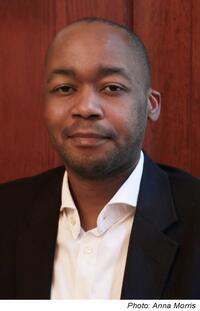ISM Fellows in Conversation Podcast
In this podcast series, current students talk with our fellows about their work.
Bongani Ndodana-Breen explores his latest composition
ISM fellow and composer Bongani Ndodana-Breen explores his latest composition fusing gospel text, pan-African sound, and the passion tradition. He also chats about his earlier operatic work that engages the sounds and figures of South Africa’s anti-apartheid struggle.
Dr. Carla Neuss on the Transformative Power of Theater
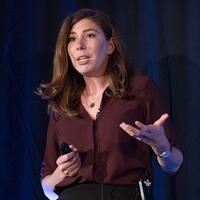
African American Womanist Preaching: Word in Conversation with Sound – Melanie R. Hill
Interviewed by Kalvin Cummings (M.A.R. ‘22)

Introduction by Clare Byrne (M.A.R. religion & music ‘22)
ISM Fellow Dr. Melanie R. Hill, assistant professor of American literature at Rutgers University, grew up attuned to the rhythms and cadences of African American preaching. Attending a church under the leadership of two remarkable women preachers in Norfolk, Virginia, Dr. Hill embarked on her own interdisciplinary path of performance, research, and scholarship. It was these women’s distinctive approaches to preaching — crafting multi-layered textures out of word and sound while speaking to race, gender, and justice — that form the foundation of Dr. Hill’s book project at the ISM, Colored Women Sittin’ on High: Womanist Sermon Practice in Literature and Music. In the project Dr. Hill explores, among other themes, how African American literature mutually influenced and informed Black womanist preaching. Dr. Hill says, “So this whole notion of literature, music and theology … all of these elements have really been the heartbeat of who I am — not only of my research, but of who I am as a scholar and an artist.”
Rebecca Dirksen: Music Research and Ecological Activism in Haiti
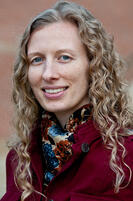 Interviewed by Ben Bond (M.Div. ‘22)
Interviewed by Ben Bond (M.Div. ‘22)
Introduction by Clare Byrne (M.A.R. ‘22)
Rebecca Dirksen’s recent book After the Dance, the Drums Are Heavy: Carnival, Politics, and Musical Engagement in Haiti delves into the Haitian concept of Mizik Angaje—socially or politically engaged music—in examining the musical traditions of Carnival. In the spiralling connections of Haitian culture, she notes that the “spaces of Carnival often become political spaces.” In continuing her radically interdisciplinary research at the ISM, Dirksen considers Haiti as one of the most vulnerable nations in the world to the effects of climate change, and subject to dire injustice in the aftermath of natural disasters. She reframes this global eco-inequality for infrastructure-poor nations like Haiti within the context of sacred music and metaphysical traditions of Voudon, “long-established ancient practice of looking at the universe in a more encompassing way.” Her conceptual work posits that these religious and musical practices may be a much-needed remedy for pressing ecological concerns of the planet.
Dirksen is associate professor in the Department of Folklore and Ethnomusicology at Indiana University, with a twenty-five-year history of living, researching, and writing about Haitian musical genres, religion, culture, and environment. She was a 2016–17 Radcliffe Fellow at the Radcliffe Institute for Advanced Study at Harvard University. Her work has been published in the Yearbook for Traditional Music, Ethnomusicology Review, the Bulletin du Bureau d’Ethnologie de la Republique d’Haïti, Conjonction, and elsewhere.
Jean Ngoya Kidula: Channeling Christianity in Kenya
Interviewed by Ben Bond (M.Div. ‘22)
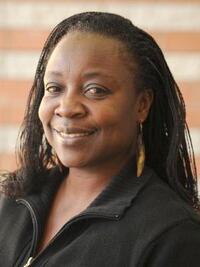
Introduction by Clare Byrne (M.A. R. religion & music ‘22)
As a pianist and singer growing up in Kenyan Pentecostalism, Dr. Jean Ngoya Kidula absorbed a multi-layered musical and religious landscape. Kenya, a center for the music recording industry in East Africa, was a crossroad of musical influences from Tanzania, Zimbabwe, the Congos and South Africa. There was no singular or “pure” African music. Raised in a rural village but under the vast imprint of British colonialism, she saw religion in its multiplicity as well. “We were keenly aware of Hinduism and Buddhism, Sikhism and Jainism,” Kidula says.
Her life’s work grew out of this complex intersection of sources. Kidula notes, “I perceive myself more as an African musicologist rather than an ethnomusicologist, just because of…the historical and colonial drama that accompanies the idea of ethnomusicology. I don’t study the other. I study who I am.” Currently a professor of music at the University of Georgia, Kidula is at work on a historical project about radio, Christianity, and politics in her home country. Kidula experienced the power of radio firsthand. As a teenager, along with her sisters, she recorded a song that received years of airplay on Kenyan radio. The power of popular music and the longstanding politicization of Christian radio in Kenya is the focus of Kidula’s ISM Fellowship project, The Gospel In the Industry of Music in Eastern Africa: 1953-2002.
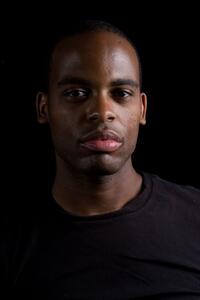 Christopher-Rasheed McMillan: Dancing through the Sacred
Christopher-Rasheed McMillan: Dancing through the Sacred
Interviewed by Clare Byrne (M.A.R. religion & music ‘22)
Introduction by Clare Byrne (M.A. R. religion & music ‘22)
Having a conversation with Dr. Christopher-Rasheem McMillan about Christianity, dance, gender, color and queerness in the year 2021 is like putting on a fabulous new pair of shades: you may open your eyes to see the world in a whole different way – or at least a different color. And it might be purple.
McMillan’s dialogue moves easily from numinosity expressed in purple flowers to biblical quotes to discussing sacred embodiment across contemporary dance and religious practices. As assistant professor of gender, women’s & sexuality studies, dance theory and practice at the University of Iowa, with research balancing scripture, sexuality and the sacred, he says “I am often trying to convince people who are in postmodern dance about the historical significance of the sacred in modern dance, thinking about Ted Shawn, Martha Graham, Alvin Ailey. And that choreographing the sacred was at the beginning of modern dance.”
Growing up in an African American Baptist-derived tradition, McMillan’s later encountered postmodern dance in a performance by choreographer Trisha Brown. He brought the two traditions together in a M.F.A. in experimental choreography from TrinityLaban (UK) and a Ph.D. from King’s College, London (UK) in theology and religious studies. His ISM Fellowship project has explored research via two approaches: a book entitled Performance Criticism: Scripture, Sex, and the Sacred and development of choreography in both solo and group form.
 Marie-Ange Rakotoniaina: Interdisciplinary Approaches to Studying Augustine
Marie-Ange Rakotoniaina: Interdisciplinary Approaches to Studying Augustine
Interviewed by Jake Cunliffe (M.Div. ‘22)
Introduction by Clare Byrne (M.A.R. religion & music ‘22)
Dr. Marie-Ange Rakotoniaina was riding the train into Paris as a university student when she had a scholarly and spiritual revelation. Years later, it became part of the foundation for her ISM Fellowship research project. Delving into the poetry of time within early Christianity, Rakotoniaina is currently researching Augustine of Hippo’s theological writings on the Sabbath and the concept of spiritual rest.
In conversation with second-year Master of Divinity student Jake Cunliffe, Rakotoniaina details her early discoveries and how Augustine re-envisioned the Sabbath in a wealth of spiritual imageries, including a sabbath within the heart. She says, “when Augustine described the sabbath as the chamber of the heart, it is an invitation to find heart within, to come back to one’s heart, and to unveil its landscape.”
Dr. Rakotoniaina brings a mystical spirit to her research and teaching. In speaking to Christian images of rest, she proposes refreshing motifs for scholarship as well: spontaneity, imagination, listening, and silence. She received her Ph.D. in Religion from Candler School of Theology at Emory University in 2020. In addition to her ISM Fellowship research, she is currently teaching courses exploring the history of early Christian liturgy and its architectures of time. She recently curated an international conference at the ISM called Keeping the Sabbath from Antiquity to Modernity: Interdisciplinary Perspectives on Time, Rest, and Cosmos. In addition to her work on Augustine, she recently completed an article on images of baptism and immersion from the Christian house church and Jewish synagogue at Dura-Europos.
